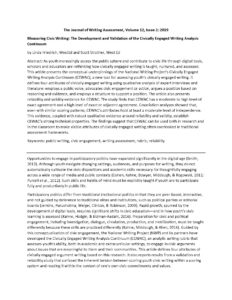Measuring Civic Writing: The Development and Validation of the Civically Engaged Writing Analysis Continuum
Excerpt
Participatory politics differ from traditional institutional politics in that they are peer-based, interactive, and not guided by deference to traditional elites and institutions, such as political parties or editorial boards (Jenkins, Purushotma, Weigel, Clinton, & Robinson, 2009). Rapid growth, spurred by the development of digital tools, requires significant shifts in civic education—and in how youth’s civic learning is assessed (Kahne, Hodgin, & Eidman-Aadahl, 2016). Preparation for civic and political engagement, including investigation, dialogue, circulation, production, and mobilization, must be taught differently because these skills are practiced differently (Kahne, Middaugh, & Allen, 2014). Guided by this conceptualization of civic engagement, the National Writing Project (NWP) and its partners have developed the Civically Engaged Writing Analysis Continuum (CEWAC), an analytic writing rubric that assesses youth’s ability, both in academic and extracurricular settings, to engage in civic arguments about issues that are meaningful to them and their communities. This article defines four attributes of civically engaged argument writing based on this research. It also reports results from a validation and reliability study that surfaced the inherent tension between scoring youth civic writing within a scoring system and reading it within the context of one’s own civic commitments and values.


